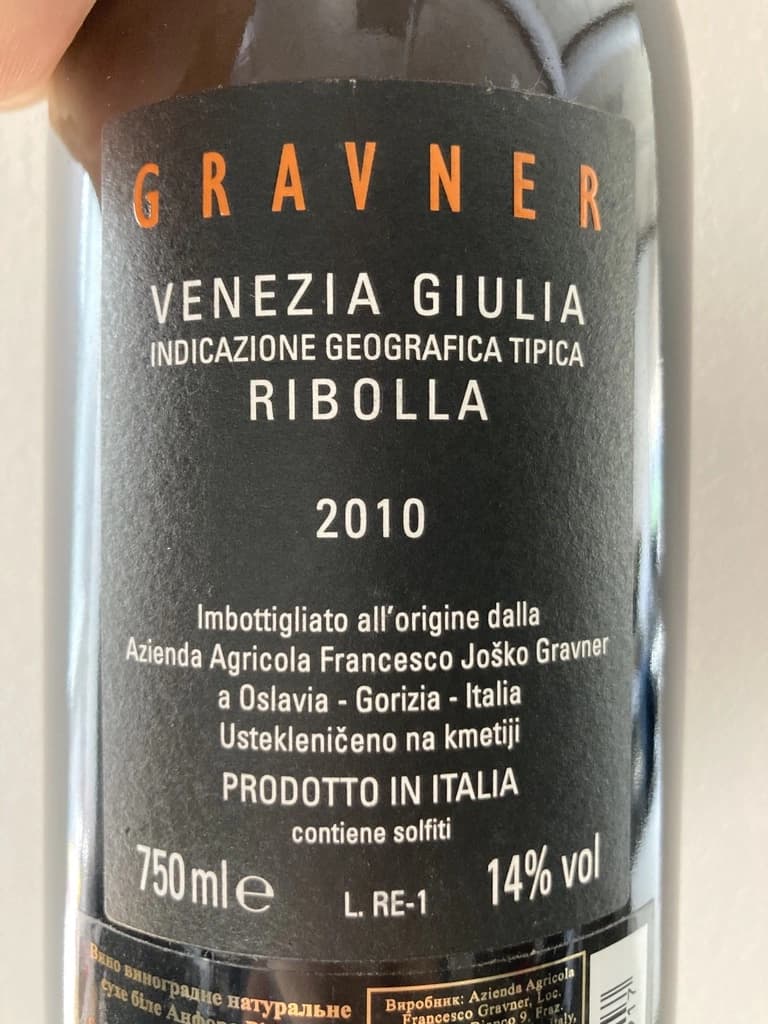Gravner Ribolla 2010
- Region
- Italy » Friuli-Venezia Giulia » IGP Venezia Giulia
- Type
- white still, dry
- Producer
- Vintage
- 2010
- Grapes
- Ribolla Gialla
- Alcohol
- 14
- Sugar
- 0.7
- Volume
- 750 mL
- Cellar
- not available

Ratings
Easily, this is the wine of the night. Captivating, sophisticated, and multilayered. Intense and beautiful bouquet of tea, pastila, orange oil, honey, amber, nuts, and calendula. On the palate, it's seamless, with good volume, freshness, and a lasting finish. Great wine.
To have an opportunity to compare two vintages of Ribolla Gialla by Gravner! Unlike '04, this one is obviously younger and more energetic, both in the nose and on the palate. Orange marmalade, candied apricot, honey, amber, calendula (sic!) or marigold and VA. Juicy and incredibly vivid, complex though it could benefit from more layers. Great experience, I definitely like this vintage more than two years ago.
Polished result of long and scrupulous craftsmanship. Unexpectedly clean style, deep and mature skin contact wine. Candy, caramel, toffee cake, apricot compote, fried nuts, dried fruits, tea. Complex, long and evolving finish. While I enjoyed this wine, it felt a little bit too polished, maybe even sterile? QPR is questionable, though I am happy to taste this iconic wine.
About Producer
Joško Gravner, often regarded as the father of the macerated white wine trend, has had an unexpected and fascinating journey in winemaking. Based in Oslavia, a small village in the Friuli-Venezia Giulia region of northeastern Italy, Gravner's winery is situated in the Collio appellation, a region renowned for its high-quality white wines.
Initially celebrated for his modern, technologically driven approach, Gravner was enthusiastic about the latest equipment and techniques. However, a transformative trip to California in 1987, a region still basking in the glory of its 1976 Judgment of Paris triumph, sparked a radical shift in his winemaking philosophy. Despite California's innovative reputation, Gravner became disillusioned after tasting 1,000 wines in just ten days, finding them uniform and lacking character.
Embarking on a nearly decade-long quest for authenticity, Gravner immersed himself in the history of winemaking. He found a connection to his roots in Collio/Brda, where his ancestors had produced skin-contact wines. This region, straddling the Italian-Slovenian border, has a long tradition of winemaking that dates back to the Roman Empire. His research also led him to Georgia, known for its 8,000-year-old winemaking traditions, including the use of skin-contact methods in large earthenware vessels called qvevri.
In 1996, a devastating hailstorm destroyed most of the yields, resulting in no wine release that year. This disaster, however, provided Gravner with an opportunity to experiment with maceration. Encouraged by these experiments, he decided to release his first extensively macerated white wine in 1997. This vintage took three long years to mature and, when released, it faced a chilly reception; the radical departure in style was too much for many. Notably, Gambero Rosso, a prestigious wine magazine, issued a scathing critique. The fallout was severe, with 80% of the vintage returned. Despite this setback, Gravner's conviction in his new direction only strengthened.
The year 2000 marked another significant milestone for Gravner. He travelled to Georgia and ordered 11 qvevri, large 1000L ceramic vessels. However, the transportation challenge was underestimated, and only two qvevri survived the journey to Italy, causing another year's delay before he could fully implement his vision. Today, Gravner's winery boasts over 45 qvevri, meaning the transportation complexities were figured out.
Interestingly, the labels of Gravner's Ribolla and Breg in the 2001 vintage bore the word 'Anfora', indicating partial use of qvevri. It wasn't until 2003 that these wines were completely fermented in qvevri. Recognizing the full transition, 'Anfora' was removed from the labels in 2007, as all wines were now qvevri-fermented.
Today, Joško Gravner's wines are celebrated as benchmarks of craftsmanship in the wine world. His Ribolla is often acclaimed as the best orange wine globally. Gravner's journey from a tech-forward approach to embracing ancient winemaking traditions not only transformed his wines but also made a lasting impact on the industry.